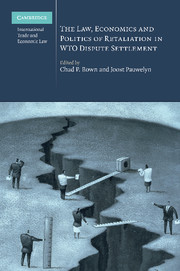Book contents
- Frontmatter
- Contents
- List of tables and figures
- Contributors
- Introduction: trade retaliation in WTO dispute settlement: a multi-disciplinary analysis
- PART I Background and goal(s) of WTO retaliation
- PART II A legal assessment after ten arbitration disputes
- PART III An economic assessment after ten arbitration disputes
- PART IV The domestic politics and procedures for implementing trade retaliation
- PART V Problems and options for reform
- PART VI New frontiers and lessons from other fields
- 21 Cross-retaliation and suspension under the GATS and TRIPS agreements
- 22 Cross-retaliation in TRIPS: issues of law and practice
- 23 Preliminary thoughts on WTO retaliation in the services sector
- 24 Compensation assessments: perspectives from investment arbitration
- 25 Reforming WTO retaliation: any lessons from competition law?
- Index
24 - Compensation assessments: perspectives from investment arbitration
Published online by Cambridge University Press: 26 February 2010
- Frontmatter
- Contents
- List of tables and figures
- Contributors
- Introduction: trade retaliation in WTO dispute settlement: a multi-disciplinary analysis
- PART I Background and goal(s) of WTO retaliation
- PART II A legal assessment after ten arbitration disputes
- PART III An economic assessment after ten arbitration disputes
- PART IV The domestic politics and procedures for implementing trade retaliation
- PART V Problems and options for reform
- PART VI New frontiers and lessons from other fields
- 21 Cross-retaliation and suspension under the GATS and TRIPS agreements
- 22 Cross-retaliation in TRIPS: issues of law and practice
- 23 Preliminary thoughts on WTO retaliation in the services sector
- 24 Compensation assessments: perspectives from investment arbitration
- 25 Reforming WTO retaliation: any lessons from competition law?
- Index
Summary
Introduction: similarities and differences between investment and trade law
The organizers of the workshop and editors of this volume have asked me to draw lessons from the compensation assessments made in international investment law for use in international trade law. Therefore, one must first inquire about the similarities and differences between these two fields of law in order to determine to what extent lessons learned in one field can be applied to the other.
There are obvious differences between international trade transactions and the classical notion of foreign investment. It has even been asserted that the broad concept of investment enshrined in Article 25 of the ICSID Convention can be characterized by drawing a contrast with international trade transactions. Yet, international trade and foreign investment law are two subfields of international economic law and the differences between the two result more from the function of the different regulatory angles which they adopt, rather than from the underlying economic realities. With the present complexity of international business transactions, it is increasingly difficult to draw a clear line between the economic realities of foreign investment and trade, as a transborder transaction (such as a sale of goods or the provision of services) may well constitute a component of a larger investment scheme.
In spite of the commonalities in terms of underlying realities, the present contribution focuses on the specific regulatory angles used by international trade law, on the one hand, and international investment law, on the other hand. Indeed, this approach appears better suited to explore the potential contribution of investment law to trade law with respect to monetary remedies for breach of a given norm or standard of conduct.
- Type
- Chapter
- Information
- Publisher: Cambridge University PressPrint publication year: 2010



